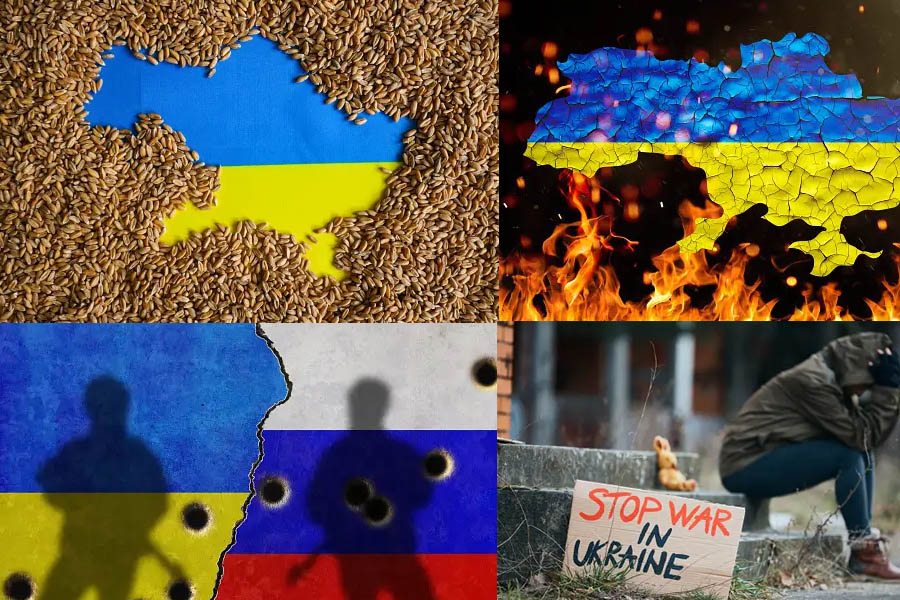
The ongoing conflict between Ukraine and Russia has taken a dramatic turn, amplifying global concerns. A Ukrainian drone strike targeting a Russian oil depot has ignited a massive inferno, adding fuel to an already volatile situation. Simultaneously, the deadlock in Congress over US aid to Kyiv further complicates the geopolitical landscape. This article delves into the latest developments and their far-reaching implications on the global stage.
Ukrainian Drone Strike Ignites Oil Depot Fire:
Accusations fly as Russia points fingers at Ukraine, attributing a devastating drone strike to Kyiv. The strike, causing a blazing inferno at a Russian oil depot near the Ukrainian border in Klintsy, follows Moscow's recent attacks on Ukrainian energy infrastructure. Kyiv terms the attack a "fair" retaliation, marking the second strike on a Russian oil depot in as many days. The flames also engulfed Ryazan oil refinery, Russia's third-largest, controlled by Rosneft.
UK-EU's Response and Growing Involvement:
Bilateral agreements aimed at bolstering defense and security cooperation, initially outlined in a G7 joint declaration supporting Ukraine in July 2023, are evolving from rhetoric to tangible actions. The recent signing of the UK-Ukraine security cooperation agreement on January 12, 2024, marks a significant step in this direction. French President Emmanuel Macron has also declared intentions to finalize a similar pact between France and Ukraine in February.
The commitment to these agreements reflects a growing alignment among Western allies in supporting Ukraine's defense efforts. In contrast, Russian President Vladimir Putin, speaking unequivocally during a forum with local government leaders on January 16, reiterated his unwillingness to engage in negotiations with Ukraine. Instead, he ominously predicted a severe impact on Ukrainian statehood due to the ongoing conflict.
Ukrainian President Volodymyr Zelensky, addressing the World Economic Forum in Davos this week, conveyed an unwavering determination to continue the fight for the complete liberation of all Ukrainian territories currently occupied by Russia. These contrasting positions underscore the intensifying geopolitical dynamics and the divergent paths chosen by the key players involved in the Ukraine-Russia conflict.
US Aid Deadlocked in Congress:
Despite President Joe Biden signing a measure to fund the US government, the deadlock over aid to Ukraine persists in Congress. Hard-right House Republicans, led by Speaker Mike Johnson, tie additional funds and weapons for Kyiv to negotiations on US immigration changes. Observers suggest that this deadlock could be a strategic move, potentially using the aid issue to attack Biden in an election year, emphasizing concerns about domestic sovereignty.
Landmines Threaten Zaporizhzhia Nuclear Plant:
Reports from the UN nuclear watchdog reveal the reappearance of landmines around the Zaporizhzhia nuclear power plant in Ukraine, now under Russian control. This unsettling development raises concerns about potential incidents at Europe's largest nuclear facility, escalating accusations between Kyiv and Moscow.
NATO's Military Exercises and Regional Perspectives:
NATO gears up for its most extensive military exercises in decades, involving about 90,000 personnel to showcase the alliance's defense capabilities against Russia. Meanwhile, Finland's Prime Minister downplays an immediate military threat from Russia, emphasizing a collective approach to security in collaboration with European leaders.
Black Sea Grain Deal and Kremlin's Stance:
The Kremlin declares no prospect of reviving the Black Sea grain deal and warns against alternative shipping routes for Ukrainian grain, citing substantial risks. This underscores the economic dimensions of the conflict and Russia's determination to assert control.
Global Ramifications and Russia's Imperial Goals:
Russia's aggressive actions against Ukraine extend beyond regional tensions, representing a calculated strategic move by President Putin to reconfigure global power dynamics. The annexation of Ukraine is not merely a territorial objective but a critical step in Putin's broader ambition to regain influence in regions such as the South Caucasus and Central Asia. By securing control over Ukraine, Russia seeks to strengthen its geopolitical foothold and assert dominance on a global scale.
Russia's strategic coalition with states like North Korea and Iran introduces a multifaceted dimension to the conflict. This alliance extends beyond military endeavors and includes various forms of warfare, such as economic, cyber, and information warfare. The collective goal of destabilizing the existing global order unites these revisionist states, creating challenges for those seeking to maintain the status quo.
The conflict underscores the pivotal role played by Western nations, both militarily and economically, in countering Russia's expansionist ambitions. The impact of the conflict extends far beyond the immediate region, as Russia positions itself in a simultaneous struggle against the collective strength of the West. The global nature of this confrontation heightens the stakes, with Russia aiming to weaken the West's global influence through a decisive victory in Ukraine.
The conflict highlights a stark contrast in approaches between Russia and the West. Russia's reliance on brute force stands in sharp opposition to the West's commitment to soft power and diplomatic solutions aimed at preserving the existing global order. The advantage lies with those who forcefully pursue change, exploiting the limitations imposed by defenders of the current order. The eventual resolution of the conflict will undoubtedly leave an indelible mark on the global geopolitical landscape, shaping the contours of the emerging new order.